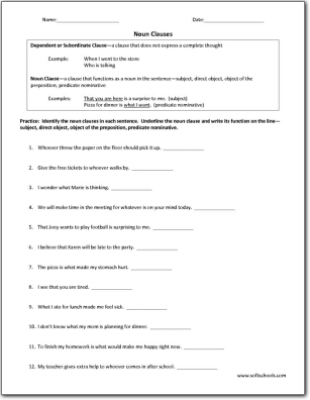Noun Clauses As Direct Objects : ️ Noun clause used as a direct object. Noun Clauses in ... - Here, the noun clause receives the action of the verb 'eat' so it is a direct object.
Noun Clauses As Direct Objects : ️ Noun clause used as a direct object. Noun Clauses in ... - Here, the noun clause receives the action of the verb 'eat' so it is a direct object.. Noun clauses can replace any noun in a sentence, including subjects, objects, and complements tip #2. In grammar, a direct object is a word, phrase, or clause that follows and receives the action of a transitive verb. In the following examples, verb is underlined and direct objects shown in color. 2.noun clauses as object complements are introduced by what (see sentences 1 and 2 above). What you have said makes her sad.
You look what you claim to be. Dependent or subordinate clauses are clauses that cannot function independently as complete sentences but that must appear with another independent or main clause. Noun clauses are a type of dependent clause that perform nominal functions. They're cool because the whole clause acts as a noun. The subordinating conjunctions in english indirect question clauses, such as those below, are another type of direct object clause.

What you have said makes her sad.
(this noun clause is the object of a preposition). A noun clause functions as a noun, which means it can be a subject, direct object, indirect object, object of a preposition, predicate nominative, or noun clauses usually begin with words called relative pronouns such as how, that, what, whatever, when, where, which, who, whoever, and why. Just like nouns do, a noun clause names functions of noun clauses. What you have said makes her sad. It can function as a direct object or an indirect object. A noun clause can either be a subject or an object. Martha will give whoever she sees there her old bag. A noun clause is another type of complex sentence that you are likely to use when you do any form of writing or speaking, so you need to be aware of them for ielts. I can do whatever i want. A noun clause is a dependent clause or subordinate clause and is not a complete sentence. Dependent or subordinate clauses are clauses that cannot function independently as complete sentences but that must appear with another independent or main clause. Noun clauses are subordinate clauses or dependent clauses that perform eight grammatical functions. Definition of a noun clause a noun clause is a clause that plays the role of a noun.
(this noun clause is the object of a preposition). (this noun clause is the direct object of ask.) he knows all about art, but he doesn't know what he likes. It can function as a direct object or an indirect object. Remember that a noun names a person, place, thing, or idea. Noun clauses are subordinate clauses or dependent clauses that perform eight grammatical functions.

The judges choose who wins.
Noun clauses are a type of dependent clause that perform nominal functions. Noun clauses are not modifiers; The noun clause is a clause that functions like a noun in the sentence. What i had forgotten was that i had a test today. Yes, a noun clause can function as a direct object.a noun clause is a group of words with a subject and a verb but is not a complete sentence.example: Subject, subject complement, direct object, object complement, indirect object, prepositional complement, adjective. They are placeholders just like a noun clause, this infinitive phrase is acting like the noun direct object. My parents are really satisfied with what i have done. Noun clauses answer the question who or what. Noun as direct object the functions of nouns in sentences. I will enjoy whatever we decide to do. Noun clauses begin with words such as how, that, what, whatever, when, where, whether, which, whichever, who, whoever, whom, whomever , and why. A clause is a grammatical structure that consists of a subject and a predicate.
A clause is a grammatical structure that consists of a subject and a predicate. My parents are really satisfied with what i have done. A clause is a group of words containing a subject and a verb. Definition of a noun clause a noun clause is a clause that plays the role of a noun. Words that introduce noun clauses

Noun clauses are clauses that function as nouns.
Second, do you know what a noun clause is? I'm elizabeth o'brien, and my goal is to get you jazzed about grammar. Yes, a noun clause can function as a direct object.a noun clause is a group of words with a subject and a verb but is not a complete sentence.example: My parents are really satisfied with what i have done. A noun clause is another type of complex sentence that you are likely to use when you do any form of writing or speaking, so you need to be aware of them for ielts. Noun clauses answer the question who or what. That is not what they want. I can do whatever i want. Noun clauses are a type of dependent clause that perform nominal functions. (here, the noun clause is the direct object of the verb knows.) it is a light thing for whoever keeps his foot outside trouble to advise and counsel him that suffers. Noun clauses are a type of subordinate clause. All sentences, then, are clauses, but not all clauses are sentences. Objects comprise direct objects, indirect objects, or prepositional objects.
Noun clauses begin with words such as how, that, what, whatever, when, where, whether, which, whichever, who, whoever, whom, whomever , and why noun clauses. Noun clauses are clauses that function as nouns.